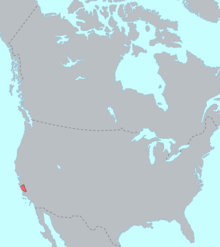Salinan language
| Salinan | |
|---|---|
| Native to | United States |
| Region | central coast California |
| Ethnicity | Salinan people |
| Extinct | 1958 |
Hokan ?
| |
| Language codes | |
| ISO 639-3 | sln |
| Glottolog | sali1253[1] |
 | |
Salinan was the indigenous language of the Salinan people of the central coast of California. It has been extinct since the death of the last speaker in 1958.
The language is attested to some extent in colonial sources such as Sitjar (1860), but the principal published documentation is Mason (1918). The main modern grammatical study, based on Mason's data and on the field notes of John Peabody Harrington and William H. Jacobsen, is Turner (1987), which also contains a complete bibliography of the primary sources and discussion of their orthography.
Two dialects are recognized, Antoniaño and Migueleño, associated with the missions of San Antonio and San Miguel, respectively. Antoniaño is "sometimes also termed Sextapay, associated with the area of the Franciscan Mission of San Antonio de Padua in Monterey County."[2] There may have been a third, Playano dialect, as suggested by mention of such a subdivision of the people, but nothing is known of them linguistically.
Salinan may be a part of the hypothetical Hokan family. Edward Sapir included it in a subfamily of Hokan, along with Chumash and Seri.[3] This classification has found its way into more recent encyclopedias and presentations of language families, but serious supporting evidence for this subfamily has never been presented.
Phonology[edit]
The charts of consonants and vowels in the Salinan language based on J.P. Harrington's notes:
Consonants[edit]
| Bilabial | Dental | Alveolar | Post- alveolar |
Palatal | Velar | Glottal | ||||
|---|---|---|---|---|---|---|---|---|---|---|
| plain | lab. | plain | lab. | |||||||
| Plosive | voiceless | p | t̪ | t̠ | k | kʷ | ʔ | |||
| aspirated | pʰ | t̪ʰ | t̠ʰ | kʰ | ||||||
| ejective | pʼ | t̪ʼ | t̠ʼ | kʼ | ||||||
| voiced | b | d | ɡ | |||||||
| Fricative | s | ʃ | x | xʷ | h | hʷ | ||||
| Affricate | voiceless | ts | tʃ | |||||||
| aspirated | tsʰ | tʃʰ | ||||||||
| ejective | tsʼ | tʃʼ | ||||||||
| Nasal | plain | m | n | ŋ | ||||||
| glottalized | ˀm | ˀn | ||||||||
| Lateral | voiced | l | ||||||||
| voiceless | l̥ | |||||||||
| glottalized | ˀl | |||||||||
| Trill | r | |||||||||
| Approximant | plain | w | j | |||||||
| glottalized | ˀw | ˀj | ||||||||
Vowels[edit]
| Front | Back | |
|---|---|---|
| Close | i | u |
| Close-mid | e | o |
| Open-mid | ɛ | ɔ |
| Open | a | |
Bibliography[edit]
- Campbell, Lyle (1997). American Indian languages: the historical linguistics of Native America. Oxford: Oxford University Press. ISBN 9780195094275.
- Mason, John Alden (1918). The language of the Salinan Indians. University of California Press. pp. 436–. Retrieved 24 August 2012.University of California Publications in American Archaeology and Ethnology 14.1-154.
- Sitjar, Fr. Buenaventura (1861) Vocabulario de la lengua de los naturales de la mission de San Antonio, Alta California. Shea's Library of American Linguistics, 7. Reprinted 1970 at New York by AMS Press.
- Katherine, Turner (1987). Aspects of Salinan Grammar, Unpublished Ph.D. dissertation. University of California at Berkeley.
References[edit]
- ^ Hammarström, Harald; Forkel, Robert; Haspelmath, Martin, eds. (2017). "Salinan". Glottolog 3.0. Jena, Germany: Max Planck Institute for the Science of Human History.
- ^ "A Glossary of Proper Names in California Prehistory: Ethnolinguistic Groups". Society for California Archaeology:. Retrieved 2012-09-26.
- ^ Sapir, Edward. (1925) The Hokan affinity of Subtiaba in Nicaragua. American Anthropologist 27: (3).402-34, (4). 491-527.
- ^ Turner, Katherine (1987). Aspects of Salinan Grammar. pp. 14–15.
External links[edit]
- Salinan language overview at the Survey of California and Other Indian Languages
- Antoniaño Salinan field recordings collected by William H. Jacobsen, Jr. spoken by Elario Quintana and Dave Mora
- "Salinan Sound recordings". Collections Search Center, Smithsonian Institution. Retrieved 2012-07-20.
- OLAC resources in and about the Salinan language